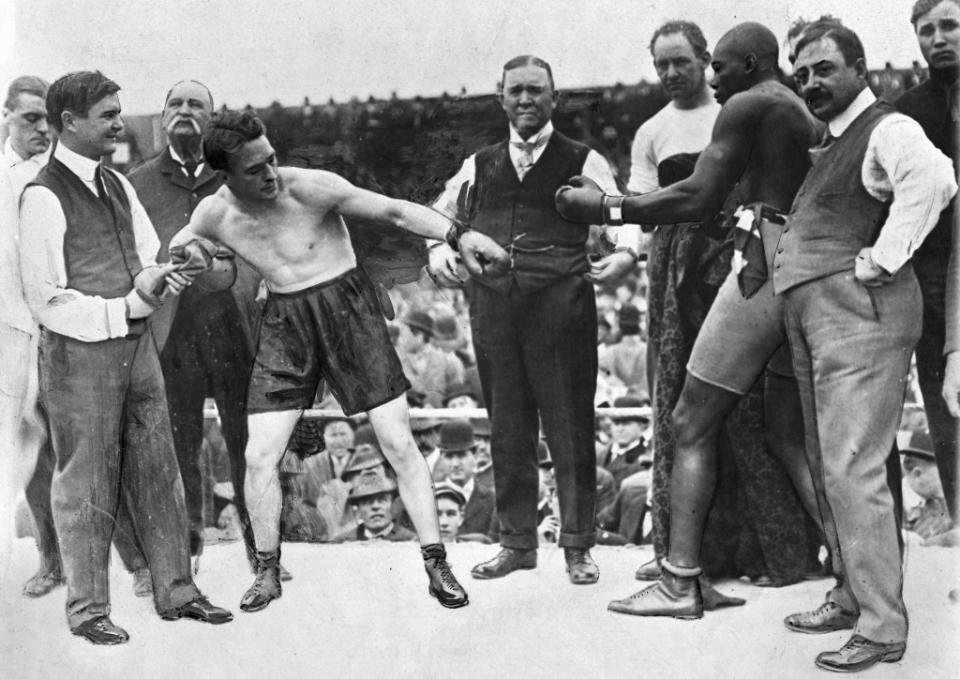Donald Trump, Colin Kaepernick and Jack Johnson
In a strange turn of events, a living, breathing athlete at the top of his game is being sidelined for his quiet protest of the police, while a long-dead, trash-talking champion is getting a second chance at dignity after being harassed by the police.
In a stranger turn of events, President Trump is a player in both stories.
Professional football player Colin Kaepernick continues to make headlines without even putting a cleat on the gridiron. The Seattle Seahawks abruptly canceled a planned workout with the quarterback, perhaps because he refused to reassure them that he would leave his social justice statements off the field. Perhaps not. Kaepernick has not had a job since he opted-out of his contract with the San Francisco 49ers last March.
But he still has his calling.
On Saturday, Amnesty International awarded Kaepernick and his now famous knee its highest honor, the Ambassador of Conscience Award. Past recipients include Nelson Mandela, Malala, and Ai Weiwei.
“The Ambassador of Conscience award celebrates the spirit of activism and exceptional courage, as embodied by Colin Kaepernick,” Salil Shetty, the organization's secretary-general, said in a statement. “He is an athlete who is now widely recognized for his activism because of his refusal to ignore or accept racial discrimination.”
But heavyweight boxing champion Jack Johnson, who died in 1946, is up for recognition of a different kind: A presidential pardon for the crime of upsetting white people.
Unlike the calm and reserved Kaepernick, Johnson was a bold figure who literally chased white opponents around the globe taunting them into sanctioned fights. Brilliant, proud, funny, gifted, rich, and unapologetically black, he fought for equal rights, in part, by demanding the world acknowledge that a black man was equal to a white one.
Johnson had been crowned the first black heavyweight in 1908; he'd defeated his opponent, Tommy Burns, so soundly, that the fight was stopped for fear of white rioting. What followed instead was a race panic so widespread that even the literati began calling for a "great white hope," to vanquish Johnson.
Heavyweight champion Jim Jeffries had entered a hasty retirement specifically to avoid facing Johnson, but he was harangued back into the ring. “Jim Jeffries must now emerge from his Alfalfa farm and remove that golden smile from Jack Johnson’s face. Jeff, it’s up to you," wrote novelist Jack London. "The White Man must be rescued.”
There was no rescuing Jeffries when the two went toe to toe on July 4, 1910, however, and a grim prophecy came true: News of Johnson's brutal victory triggered race riots across the country. Black folks were killed, their homes burned. President Theodore Roosevelt banned footage of the bout from U.S. theaters for fear of more violence.
But Johnson also affronted the public by consorting with and marrying white women. In 1913, the champion was arrested for violating the Mann Act, a statute designed to prevent trafficking and prostitution, but was disproportionately used to harass African Americans. He was targeted and detained for “traveling across state lines” with his white girlfriend.
Convicted by an all-white jury, Johnson fled the country and continued fighting in Europe, though returned and spent ten months in Fort Leavenworth.
So imagine Twitter's surprise when President Trump suddenly weighed in on the Johnson story on Saturday.
Sylvester Stallone called me with the story of heavyweight boxing champion Jack Johnson. His trials and tribulations were great, his life complex and controversial. Others have looked at this over the years, most thought it would be done, but yes, I am considering a Full Pardon!
— Donald J. Trump (@realDonaldTrump) April 21, 2018
"Sylvester Stallone called me with the story of heavyweight boxing champion Jack Johnson. His trials and tribulations were great, his life complex and controversial," he tweeted. "Others have looked at this over the years, most thought it would be done, but yes, I am considering a Full Pardon!"
The “others” he's referring to include President Obama, who declined to issue a pardon even after both houses of Congress agreed to a resolution asking for one.
Now, I'm keenly aware that nothing can be accomplished by pointing out that the president's petty harassment of Kaepernick- repeatedly calling for his suspension, and even crediting himself for the quarterback's woes- has no doubt contributed to his current lack of employment. “[The NFL owners] don’t want to get a nasty tweet from Donald Trump. Do you believe that?” he said to a rally in Louisville, Kentucky after Kaepernick became a free agent last March.
Nor will I dwell on the cognitive dissonance associated with the president's sudden support of a man who was also a heavyweight champion in triggering white anxiety and violence. (Or the fact that Jack London is now canceled.)
Instead, let's just enjoy the moment. Both Kaepernick and Johnson were keen observers of systemic racism, both used the attention garnered by their excellence to push for equity — though in very different ways — and both had their careers threatened for their efforts. Both deserve to be recognized, remembered, and to have respect put on their names.
If we end up with Sly Stallone as a cabinet member or some such, so be it.
[ Editor’s note: Studying Jack Johnson's life provided an early awakening for me and helped me to re-contextualize the American history I'd been taught. Go deep if you've got time: Unforgivable Blackness is both a book and documentary, here is a virtually unknown memoir.]
Ellen McGirt writes Fortune's raceAhead, a daily newsletter about race and culture.
See original article on Fortune.com
More from Fortune.com


